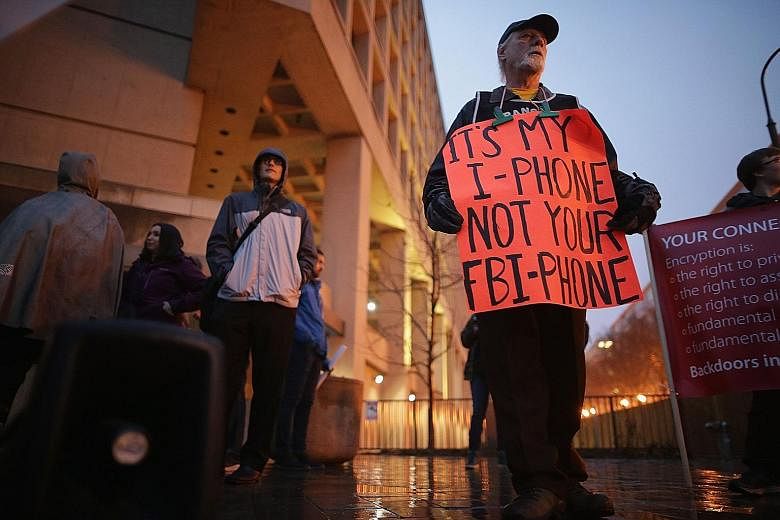SAN FRANCISCO • Apple chief Tim Cook went public on Wednesday in his battle with the Federal Bureau of Investigation (FBI), saying unlocking an iPhone in the name of fighting terrorism would be "bad for America".
He equated code capable of breaking into an iPhone to a "software equivalent of cancer" that should never be unleashed on the world.
"This is not about this phone," Mr Cook said in an interview with ABC News. "This is about the future."
Apple is involved in a legal fight with the FBI, which wants it to help hack the iPhone of Syed Farook, a US citizen who gunned down 14 people with his wife Tashfeen Malik in San Bernardino in December. It is also fighting another 10 cases related to unlocking its devices.
When asked how he felt about Apple taking the stand with a chance the information on Farook's iPhone might prevent another terrorist attack, Mr Cook responded: "Some things are hard and some things are right. And some things are both. This is one of those things."
He maintained that the definite dangers of creating a way to crack iPhone encryption trumped concerns about "something that might be there".
Apple is being asked to write software that it believes would make iPhones vulnerable. The only way it knows to get more information from Farook's iPhone would be to "write software that we view as the software equivalent of cancer... it is bad news to write", Mr Cook said.
He argued that the FBI demand threatens to "trample on civil liberties" and starts a slippery slope that could lead to other court orders, such as building police surveillance capabilities into devices.
"It is clear that it can be a precedent," Mr Cook said. "If the government can order Apple to create such a piece of software, it could be ordered for anyone else as well."
Mr Cook planned to discuss the case with US President Barack Obama, and said his company was prepared to take the matter all the way to the Supreme Court.
"We have no sympathy for terrorists," he said. "We aren't protecting their privacy; we are protecting the privacy of everyone else. A physical key you could shred. A software key would stay living."
He called for the clash to be settled by Congress passing law that clearly defines what private companies are required to do in such cases.
But Apple engineers are already developing security measures that would make it impossible for the government to break into an iPhone.
This will create a challenge for law enforcement agencies, even if the government wins its fight over access to data on Farook's iPhone.
"For all of those people who want to have a voice but they're afraid... we are standing up for our customers because protecting them, we view as our job," Mr Cook said.
AGENCE FRANCE-PRESSE, NEW YORK TIMES

